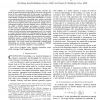Free Online Productivity Tools
i2Speak
i2Symbol
i2OCR
iTex2Img
iWeb2Print
iWeb2Shot
i2Type
iPdf2Split
iPdf2Merge
i2Bopomofo
i2Arabic
i2Style
i2Image
i2PDF
iLatex2Rtf
Sci2ools
TWC
2010
2010
Bandwidth exchange: an energy conserving incentive mechanism for cooperation
Cooperative forwarding in wireless networks has shown to yield rate and diversity gains, but it incurs energy costs borne by the cooperating nodes. In this paper we consider an incentive mechanism called Bandwidth Exchange (BE) where the nodes flexibly exchange the transmission bandwidth as a means of providing incentive for forwarding data, without increasing either the total bandwidth required or the total transmit power. The advent of cognitive radios and multicarrier systems such as Orthogonal Frequency Division Multiple Access (OFDMA) with the ability to flexibly delegate and employ a number of subcarriers makes this approach particularly appealing compared incentive mechanisms that are often based on abstract notions of credit and shared understanding of worth. We consider a -node wireless network over a fading channel and use a Nash Bargaining Solution (NBS) mechanism to study the benefits of BE in terms of rate and coverage gains. We also propose two heuristic algorithms based ...
| Added | 23 May 2011 |
| Updated | 23 May 2011 |
| Type | Journal |
| Year | 2010 |
| Where | TWC |
| Authors | Dan Zhang, Ryoichi Shinkuma, Narayan B. Mandayam |
Comments (0)

